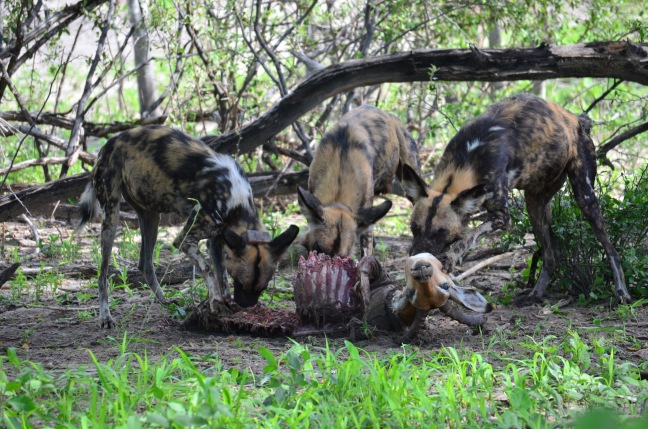Our new research shows that African wild dogs don’t hunt collaboratively or chase prey over long distances.
Pack-living African wild dogs are known as super-successful hunters, supposedly collaborating in coordinated attempts to run down their prey in long-distance chases. Such hunts have been dramatized in numerous wildlife documentaries, including Sir David Attenborough’s sensational series “The Hunt”. However, our new research, published as a pair of papers in Nature Communications, challenges these popular perceptions. Rather than collaborating to out-manoeuvre and wear down prey over long distances, wild dogs actually owe their hunting success to short high-speed runs, undertaken during hunts that typically lack high-level coordination between dogs.

At our study site in Botswana, we fitted an entire pack of six dogs with sophisticated solar-powered data-logging collars that were built in-house by Professor Alan Wilson’s research team at the Royal Veterinary College in London. These collars are a sensational feat of engineering, and we were rewarded with the first simultaneous recordings from all individuals in a pack in their natural environment, and some really interesting and novel insights into the hunting ecology and dynamics of this incredible endangered species.
While popular and historical accounts describe high level collaboration between dogs hunting over long distances (usually in the short-grass plains), the reality in the woodland savannah of the Okavango delta was quite different. In fact we found zero evidence of high-level cooperative hunting. Instead, individual dogs ran independently of other pack members, did not assume particular roles and never ran ‘relays’ (taking over the chase from a tiring pack-mate; a common misconception). In fact, hunts lacked any evidence of advanced levels of coordination at all.
While this lack of coordination was unexpected, perhaps even more surprising to us was the short distances and high speeds over which hunts took place. African wild dogs are considered the epitome of endurance hunters, chasing down their prey over long chases lasting many kilometres, but once again we found that the dogs confounded our expectation. Instead of engaging in marathon chases, ‘our’ African wild dogs typically employed short bursts of speed over distances averaging a mere 213-metres, and they only ran at high speed for a mere 1km each day. This is well short of the many kilometres previously reported and considered to be typical of the species.

So why is all of this important? Marathon chases were the main reason that African wild dogs were considered vulnerable to the impacts of losing their hard-earned spoils to competitors like spotted hyaenas. However, because wild dogs appear to ‘pay’ much less for their dinner than was previously thought, it’s also cheaper to lose that food. Their ‘tactic’ of hunting via a series of independent shorter chases and sharing the spoils with their pack mates therefore makes African wild dogs more energetically robust to losing their prey than was previously thought.

A note of caution though. While this is obviously a welcome bit of good news for this endangered species, African wild dogs are not out of the woods yet. Wide-ranging packs are often exposed to human threats outside protected areas, which are generally too small and filled with competitors to maintain viable populations of African wild dogs. We clearly still need space and coexistence strategies to protect these iconic hunters, and that ultimately is our major research focus.
If you’re interested, you can access the papers here: Hunting strategy paper – Energy balance paper, or via the links under my Publications page.
Links to this research in the press
Science magazine: Wild dogs have adapted to threats by hunting more like cheetahs
National Geographic blog: African Wild Dogs Sharing Kill With The Pack Are More Efficient Than Cheetahs
Natureasia: Sharing is key to wild dog hunting success
IFLScience: African Wild Dogs Sharing Kill With The Pack Are More Efficient Than Cheetah
[Note that the study described above was funded by the European Research Council, Biotechnology and Biological Sciences Research Council, and Engineering and Physical Sciences Research Council and with the kind permission of the Government of Botswana. The Botswana Predator Conservation Trust is supported by grants from the Paul G. Allen Family Foundation, Wild Entrust International, Tusk Trust and private donors.]
